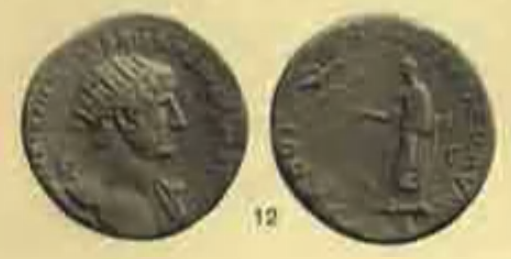
Even though I went through a “Hadrian focus” in my reading some years back, I remained unaware of the potential relevance of several details of that emperor’s reign to the Book of Revelation as highlighted by Thomas Witulski’s several works. So when my good friend Serendipity showed me another work independently addressing some of the same issues Witulski covered, I once again put blog posting on hold until I could finish reading that new work along with several of its citations. The “new” work is a PhD thesis by Demetrios Kritsotakis and the extracts below will tell you why I think it is an appropriate addition to the discussion of Witulski’s thesis:
Hadrian and the Divine
An important factor that determined Hadrian’s policy in the East was his personality. Among other things, the emperor was interested in divination and mystic cults, magic and superstitions, was skilled in astrology, knowledge of every science and art, and was even credited with healing powers. Although this aspect of his personality is not directly connected with his cult in the region, it pertains to the divine, the superhuman and as such I deem it worthy of being examined here. Moreover, I believe that these interests of his facilitated his reception among the. Greeks. They were part of the religion-colored language that the Greeks and the emperor used to communicate with each other.
In spite of the fact that this aspect of Hadrian’s life was the subject of great interest in our sources, modern scholarship has underestimated the significant role that it played in the creation of his image in the East.
(Kritsotakis, Demetrios. Hadrian and the Greek East: Imperial Policy and Communication. PhD, Ohio State University, 2008. pp. 186f.)
and . . .
This chapter will discuss the role of religion in the promotion of Hadrian’s program and vision for the Greek East in the region. The center of his religious program was the imperial cult, which focused on the emperor but also on the imperial house, especially his wife Sabina, and outside of it on his young lover Antinoos. However, here I will not talk about the mechanisms of the cult and the individuals involved. This has been amply treated in modern scholarship. Instead, I will discuss aspects of his religious program that have not received the attention they deserve so far. (K, p 161)
I will post in two parts a series of extracts from Kritsotakis’ thesis, grouping them under headings relevant to W’s interpretations of Hadrian in Revelation. (The one detail K does not mention is the introduction in Asia Minor of private household shrines for Hadrian.)
Emperor Cult Taken to New Levels
Hadrian received more divine honors in the Greek East than any of his predecessors. These honors, among them the unprecedented erection of statues, his worship in shrines, and close association with many Greek divinities, strengthened his relationship with the region and placed him in the heart of religion and the Greek pantheon. In honoring him the Greeks identified Hadrian with major divinities of their pantheon. Hadrian became the manifestation of Zeus, Apollo and other gods on earth, and a number of epithets were used to address him as a god. (K. 162)
.
Hadrian was hailed by the Greeks in an unprecedented association with Zeus and was viewed by them as the new Olympian who would preside over their councils and lead them. (163)
.
To start at the beginning, Hadrian promoted his appointment as emperor as the direct result of divine appointment. Among the senatorial ranks in Rome questions had been raised about the legitimacy of his succession to Trajan.

Thus, early in his reign, Hadrian wanted to state his divine election publicly. . . . [T]he message carried here [the eagle coming to Hadrian in the coin image above] was that it was not by the foresight of mortal men or even a mortal now deified, but by the foresight and the care which the gods exercised for the Roman commonwealth that Jupiter sent his messenger, the eagle, to grant Hadrian the ruling of the world. . . .
. . . if it were ever doubted whether Rome’s rulers were appointed by chance or by the gods, it is now clear that the present princeps owes his position to the will of the gods; not by dark processes of fate, but clearly and openly by Jupiter himself. (167-168)
But back to the worship of Hadrian . . .
